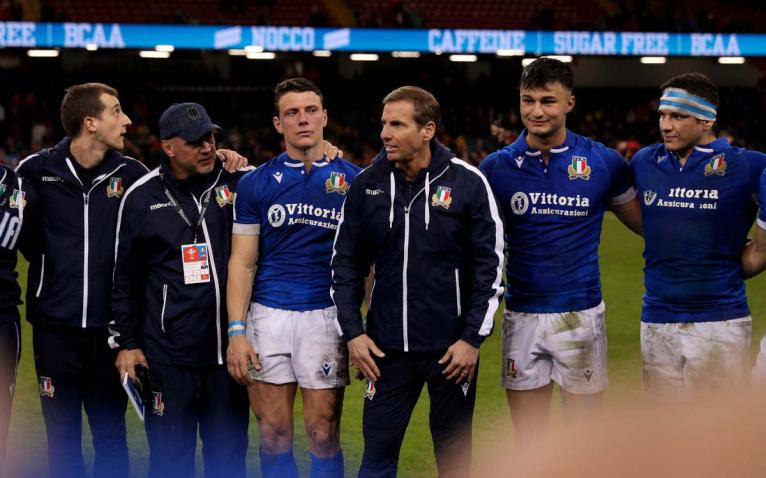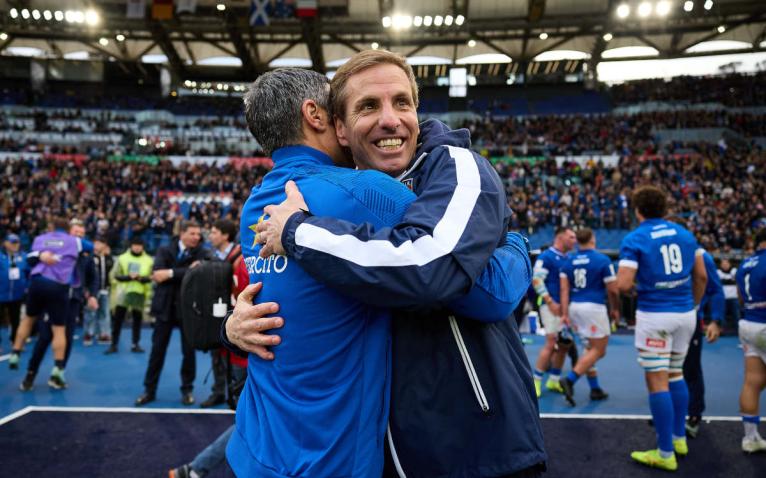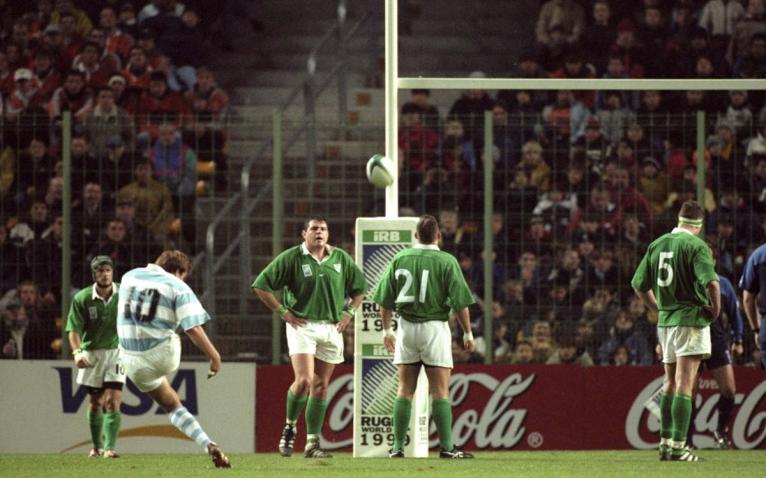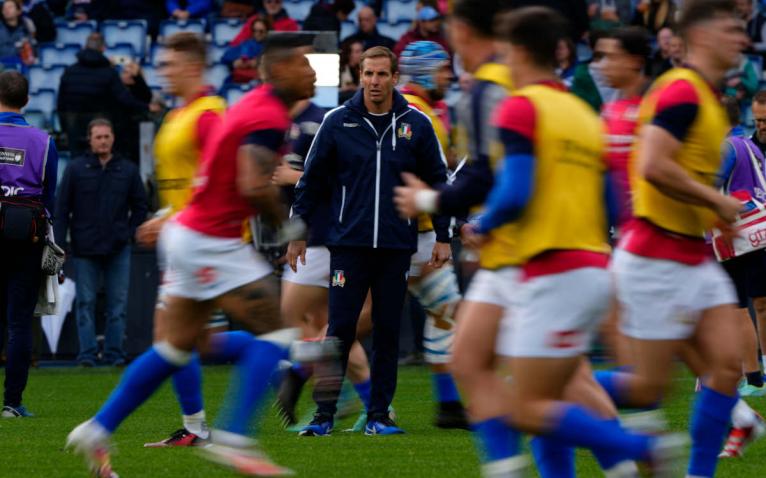There is a problem when speaking with Gonzalo Quesada. His openness is both a revelation and a pressure. The way more than an hour’s conversation with the Italian head coach unfolds has so many rich angles and areas of interest that deserve being shared, the only constraint is space and what you decide to leave out.
His compelling rugby trajectory, as positive and enjoyable as it was, has taken him to a role in which he has excelled without skipping a beat. Few doubted his ability, but many are surprised how quickly he has turned his Azzurri players from doubters into believers.
His arrival at the helm of the Six Nations perennial losers, who for 24 years had been unable to trouble the likes of England or Ireland, has elevated the team to previously unseen heights, and to the layman’s eye, at least, this upturn in results did not feel like a flash-in-the-pan.
Quesada has genuine rugby intellect. From a toddler running around the Hindú Club in the outskirts of Buenos Aires whilst his dad Bebe coached the seniors, his destiny was always linked to the game.
In time, he was to secure 39 caps with Argentina, from 1996 to 2003, which included taking home the Golden Boot in RWC 1999 with 102 of his 486 test points.
A legend of Hindú Club, he pinballed around the Top 14, playing for five French clubs before returning to Argentina for a final club dance.

His transition from player to coach was seamless; his first gig, kicking coach for the French team, who were losing finalists at the Rugby World Cup in 2011.
Feeling he needed to add to his rugby resume, Quesada, who already had a degree in economics and administration, got his head down to study for a diploma in Mental Preparation Applied to Performance and an FFR diploma as Professional Coach and Manager, furthering his reputation as a savant of the game. “Over the years I’ve done many other courses. I also listen to a lot of podcasts. I type in leadership, coaching, mental preparation, high performance and will listen to whatever comes up whilst I drive,” he says from his new home in Milan, where he lives with his wife.
A two-time French champion with Stade Français and Super Rugby finalist with the Jaguares, Quesada was always keen to coach at international level. The logical step would have been to take over Argentina, but fate intervened as Covid-19 shut down the world and there were no assurances this would happen.
We live in the north of Italy as it is closer to players and clubs. My wife had lived in Milan before and we found a nice residence in the outskirts.
Even though he met with the Argentine Rugby Union and they offered him the assistant coach role, most rugby fans in the country would have loved to see him as head coach of Los Pumas, yet it wasn’t to be. “For a variety of reasons,” he explains without a hint of bitterness or regret.
So, when the offer came to coach Italy after many years living in Paris – where he coached Racing 92 and Stade Français – he said yes. “We live in the north of Italy as it is closer to players and clubs. My wife had lived in Milan before and we found a nice residence in the outskirts. I am just over an hour from Parma and two and a half hours from Treviso where the players and staff are mostly based.”
Another decision he made early on was that the language spoken with the team would be Italian, so it was back to the books and audio tapes. “It felt a change that needed to be done. Italy probably has less overseas players than say England, France or Scotland.” Even with a bevy of multinational staff, all meetings are now in Italian.

In succeeding Kieran Crowley, Quesada had a plan. He moved to Italy way far in advance of his contract starting on January 1st, to hold a couple of camps with players and staff.
Having shipped almost 160 points from shellackings by both New Zealand and France at last year’s World Cup, which left the team “traumatised”, he had work to do. A renewed team culture, a new identity, how they connected and setting the commitment bar very high was top of the agenda. “It was about knowing what Italy represented to the players, what it meant for them to play for the Azzuri. We also focused on making sure we gave continuity to the good work done by Kieran (Crowley) and his staff,” he explains. In the early days, 10 players based overseas could not attend those camps, but they soon found a way, and momentum was found.
Argentina’s loss was Italy’s gain and his influence was seen almost immediately.
“We had a good build-up before facing England. We discussed many things and I told them I didn’t want to be a team with a pretty attack yet unable to compete. I wanted the attacking DNA they already had but to change the system and shapes, keeping their Latin flair, passion, cuore (heart), but tallied with hard work in defence and possession.”
February 25, 2024, is a date that will be remembered for years to come. Italy coulda-shoulda-won against France, yet emerged with a draw. That 81st-minute penalty by Paolo Garbisi that ricocheted off the goalpost will be talked about for generations.
England were pushed to the limit at the Stadio Olímpico with Italy very close to enjoying an historic win. Given the lack of success in Six Nations history, a 24-27 loss was hailed as a success by many. Yet within the team, there were no celebrations.
A week later the 36-0 loss to Ireland was a step back and Quesada cut a frustrated figure. “We lost in a game in which our lineout did not work but we defended for 80 minutes, at times 24, 25 phases.” Yet there were small steps in the right direction.
February 25, 2024, is a date that will be remembered for years to come. Italy coulda-shoulda-won against France, yet emerged with a draw. That 81st-minute penalty by Paolo Garbisi that ricocheted off the goalpost will be talked about for generations. Should it have been taken again? We’ll never know, but the 13-13 result left deep scars.
A threshold had been crossed and the Italians would go on to win the next two games – 31-29 against Scotland in Rome and 24-21 against Wales in Cardiff.

“I think the big success during the Six Nations was to improve week on week. We showed glimpses of our potential against England. Ireland was a strange game, and even though we had never beaten France, a draw gave us belief.
“This is a team that four months earlier had lost by 60 points. Who knows when we’ll have another chance to be as close as this one. It was a pity all the hard work put in didn’t merit a win.”
Having done their homework, in units and individually, the team took ownership. They had to come up with presentations and the common thread was how to be consistent.
“In those Scotland and Wales games we proved we can be consistent.”
The Six Nations was everything Quesada hoped for. He had been involved with France more than a decade earlier and later as a pundit, but this time “it was spectacular, all that I expected it to be”.
“There is a true passion for the Six Nations in Italy. The drive from the hotel to the stadium, through Rome’s landmarks all full of fans, was incredible. Spending the day with the other head coaches at the media day was when I realized what I was coming into,” Quesada recounts with a wide smile.
Coaches are all very open when it comes to the game and we talk a lot about team management, group dynamics. We face similar challenges and, at times, the only one that can understand what you are going through is someone that is going through the same
“It also has the after-match dinners; mixing with the opposing team is important to maintain.”
If one of the traditions of the game is the friendships it generates, Quesada’s considers many of his peers as friends.
“I am good friends with Joe Schmidt, Michael Cheika, Ian Foster, Tana Umaga, Gregor Townsend, Ronan O’Gara, Ugo Mola and during the World Cup we had lunch with Scott Robertson, another friend.
“We are all very open when it comes to the game and we talk a lot about team management, group dynamics. We face similar challenges and, at times, the only one that can understand what you are going through is someone that is going through the same.”
One of his closest mates is new Wallabies coach, Schmidt. “I did my coaching diploma with him in 2008/09 and we spent a lot of time together.”

Far from resting, Quesada is already working on the next chapter. “I am very self-motivated. If I am to ask a huge amount from the players, I must be ready with each team talk, video session, logistical issue. I get involved in every aspect and I demand the complete dedication from my staff.”
The way Quesada handles himself ensures that the pressure does not appear as negative or stressful. “We enjoy ourselves and laugh a lot.”
The next adventure has its challenges: a tour to Samoa, Tonga and Japan. Currently ranked eighth, Italy need to continue the upward trend in the toughest of environments.
“The players are tired and don’t have opportunities to rest as Benetton are doing well in Europe. By the time they play the last game, they will be in their 59th week of the season. Fortunately, after what we’ve achieved, they are all keen to come on tour.”
Being involved in all of this is a privilege and we are masochists in a way, but we love it and wouldn’t have it any other way
Based in Auckland, Italy will first travel to Apia to tackle Samoa, return to Auckland and then on to Nuku’alofa for a test against Tonga. The tour will finish in Sapporo, in the north of Japan, with a test there. “Three tough games, a lot of travel. I see it fit to go to the Islands and extend our respect and also allow them to play at home.
“There will be a lot of adversity but we must continue to grow. We have big challenges ahead and one of them is how to keep players fresh and we are planning some activities for that. I want it to be an enjoyable tour and that can create positive memories.”
The best way will be winning and reinforcing what the world saw in the Six Nations – a side ready to take up their real position in the game. That is what motivates Quesada.
“Being involved in all of this is a privilege and we are masochists in a way, but we love it and wouldn’t have it any other way.”



Good, deep interview, nice job Frankie!